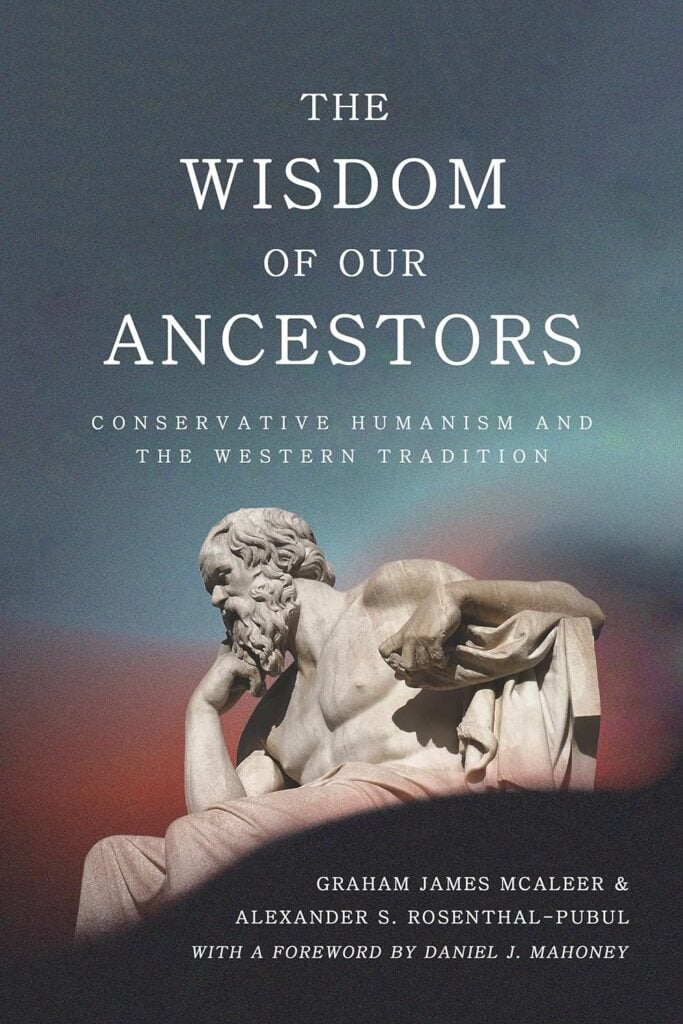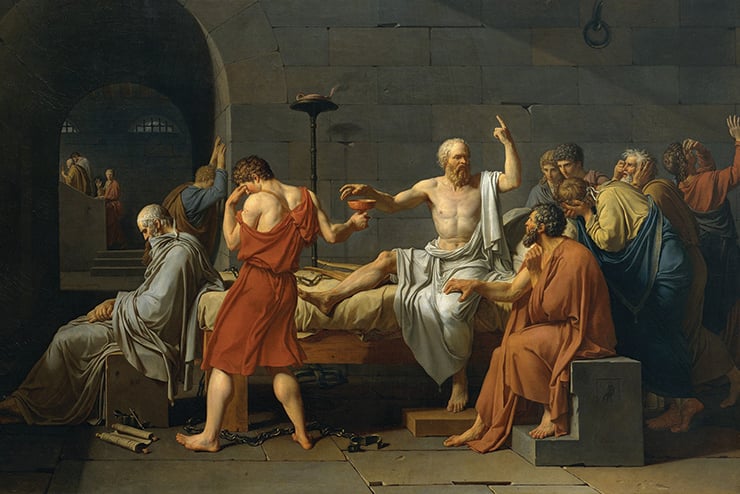Christian humanism is the beating heart of Western civilization. Conservative politics is impossible without it.

The Wisdom of Our Ancestors: Conservative Humanism and the Western Tradition
by Graham James McAleer and Alexander S. Rosenthal-Pubul
University of Notre Dame Press
314 pp., $55.00
America’s elite universities are at war with Western civilization. And the public is finally starting to notice.
Claudine Gay, the archetype of the modern university professor and administrator, was forced to resign as president of Harvard after she faced allegations of plagiarism, following a troubled tenure marked by her inability to deal with disruptive student protests. Even though her rise at Harvard signaled the triumph of the radical diversity, equity, and inclusion (DEI) movement in higher education, it is by no means clear that her departure will signal its demise. After all, the ratio of liberal to conservative professors at her institution remains a jaw-dropping 26:1, according to a survey conducted by The Harvard Crimson last year.
It took generations for educators committed to anti-Western pedagogies to take control of higher education in this country. They instilled hatred of the West in the minds of unsuspecting students. It will take generations to reverse the trend.
Judging from the arguments of Graham James McAleer and Alexander S. Rosenthal-Pubul in this superb book, the survival of conservative political philosophy depends on our ability to reverse these trends in educational institutions, from K-12 schools to the university system.
“Conservative humanism,” the authors write, “is a defense of the West.” The fate of conservative political philosophy depends on the ability of educational institutions to transmit the Western tradition and way of life to students.
The tradition of liberal education in the West is what Erasmus called “learned piety.” The aim of liberal education is the aim of civilization itself, what Cicero called humanitas, the development of human capacities, which distinguish us from beasts. The classical aspect of the liberal arts, deriving from our Greco-Roman heritage, teaches us how to become free citizens. The Christian aspect of the liberal arts, deriving from the Hebrew and Christian scriptures, teaches us how to become free from sin and to realize our transcendent potential over our merely temporal one.
Christopher Dawson, the 20th-century British historian, looms large in the authors’ defense of classical education. He argued that Christian humanism served as the beating heart of Western civilization. And he argued that Christian humanism is transmitted by means of classical education. This type of education is the offspring of the dynamic interaction between Athens, Rome, and Jerusalem. It was passed down—and amended along the way—from Greek Sophists, to Latin rhetoricians, to medieval monks, to Renaissance schoolmasters, and ultimately to modern European and American universities.
Conservative political philosophy, from this perspective, consists of a rich civilizational mosaic that trains the moral and spiritual imagination, teaching individuals what it means to be dutiful citizens and excellent human beings. Liberal education should pass on this civilizational inheritance: the philosophical, legal, and religious ideas and practices that make us who we are. Our educational institutions are failing at this task.
Efforts to reform what passes for liberal education today—with its narrow focus on race, gender, and sexuality, and its castigation of Western ideals and institutions as racist, patriarchal, and sexist—are conservative reform efforts. Conservatism in the United States today is associated with reaction, the propensity to halt progress. But it is liberalism—along with progressivism, its demented offspring—that is truly reactionary. It is a reaction against, and rejection of, Western humanism.
McAleer and Rosenthal-Pubul follow Sir Roger Scruton in regarding conservatism as a “politics of rescue.” Conservatism became self-conscious only after the French Revolution, which tried to abolish the old and create a new civilization. At that time, the “default traditionalism” of Western culture turned into a movement against the left’s revolutionary vision of progress.
Revolutionary activity threatens to dislodge inherited ways of living in nonpolitical spaces—for example, in the family and religion. We are witnessing revolutionary activity when public libraries are chock-full of children’s titles like Woke Baby and My Two Dads and Me, which are designed to reorient children’s moral imaginations against the traditional family. We are witnessing revolutionary activity when a trans prostitute is memorialized in St. Patrick’s Cathedral in New York City and nonbeliever LGBTQ activists engage in mock prayer, cheering their usurpation of a holy site. When revolutionary fervor arises, it becomes ever more urgent for conservatives to engage in the “politics of rescue,” to act politically to preserve the ideals of Western humanism.
McAleer and Rosenthal-Pubul excel at unveiling the civilizational core of the conservative project. Their definition of conservatism as a defense of civilization leads them to regard religion, the family, and education as the “conservative trinity.” These institutions, they argue, are responsible for passing on the wisdom of the ancestors; that is, the Western humanism that constitutes conservatism.
Interestingly, “the nation” is missing from their conservative trinity. One way for conservatives to challenge the liberal conception of the individual, which elevates rights over duties, is to highlight the importance of the three necessary human societies: family, religion, and nation. These institutions help us find our identity in relation to three fathers: the earthly father, the heavenly father, and the fatherland. In an age of identity politics, when it seems no one knows who or what they are or why they exist, it is imperative to once again root individuals in these basic communities that give meaning and purpose to life.
McAleer and Rosenthal-Pubul, however, substitute “education” for “nation.” They regard conservatism as the “wisdom of the ancestors,” which means that conservatism is confined to no particular nation or regime type. Instead, conservative political philosophy provides a shared history and self-understanding that forms the basis for supranational cooperation.
The authors also distance themselves from the project of Christian nationalism. They present conservative humanism as a middle road between liberal universalism and antiliberal particularism. And they seem to regard nationalism as a form of antiliberal particularism.
By categorizing nationalism as a form of antiliberal particularism, the authors create a bit of a conundrum. They differentiate liberalism from conservatism, so the problem with nationalism cannot be its antiliberal tendencies. It is debatable, moreover, whether nationalism is antiliberal at all, given its historical connection with liberal democratic revolutions in the 19th century. And it certainly cannot be particularism that is offensive to conservatism.
The authors acknowledge, moreover, that “self-organization is one of the pillars of conservative humanism.” One of those organs of self-government is the state, which the authors think can play a positive role in sustaining thriving communities. Their conservatism, then, is not of the anti-statist variety.
What bothers the authors is not particularism or antiliberalism. What they object to is the repaganizing of society. They regard members of the French New Right and acolytes of the Russian political philosopher Aleksandr Dugin as advocates of a new paganism. Insofar as political theories militate against Christianity and natural law, they militate against our civilizational heritage.
The authors present conservative humanism as avoiding two errors. The first is false universalism, of the kind infamously argued by Francis Fukuyama in The End of History and the Last Man (1992), in which liberal democracy, having prevailed over communism, would spread across the globe as the final reigning ideology. This ideology has proved utopian and revolutionary. It has called for unelected technocrats to tinker with the world, erase borders, and regard individuals as consumeristic, isolated pleasure-maximizers. It has broken down traditions and natural social bonds. It has presented autonomy as the ultimate good.
The second error is the rejection of universalism altogether. Dugin, for example, argues that the embrace of ethnic identity and local moral and religious traditions will comprise a new mode of political thought—his “Fourth Political Theory” (after fascism, communism, and liberalism)—capable of dethroning post-war liberalism. Dugin’s theory, though, regards every tradition as subjectively good, with no higher law capable of judging the customs and culture of self-determining political units.
McAleer and Rosenthal-Pubul present a corrective to both errors. They seek to balance the airy and the earthy, the abstract and the mundane, the universal and the particular. And this is where Christianity and natural law prove indispensable to their account of the development of Western civilization.
Christianity springs from the Incarnation, that perfect blend of the heavenly and the earthly. Liberalism, however, is overly reliant on the heavenly and is detached from lived reality. It portrays human beings as abstract individuals desiring to escape the bonds of nature.
Varieties of postliberalism, on the other hand, are overly reliant on the earthly. They tend to reject universal moral norms in favor of native traditions. A conservative political philosophy, grounded in Christian humanism, has the resources to strike the appropriate balance.
A Christocentric culture recognizes the importance of both body and soul. This allows it to harmonize matter and spirit, the universal and the particular. T. S. Eliot wrote, “If Christianity goes, the whole of our culture goes.” McAleer and Rosenthal-Pubul might add that if we lose the war for Western culture, we lose the very possibility of conservative politics.

Leave a Reply